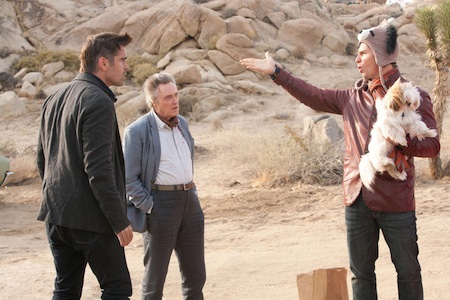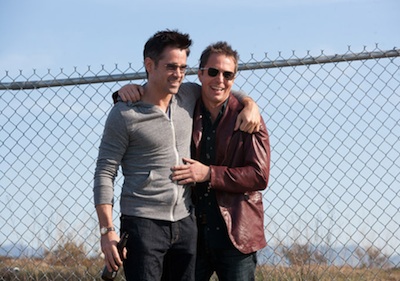Martin McDonagh’s debut, hit men comedy In Bruges, made light of life’s frailty without robbing the deadly serious of its gravity.
It was a difficult tone to strike just right, and McDonaugh’s next project, Seven Psychopaths, similarly walks the tone tightrope with success, even with its larger cast and more self conscious story about an alcoholic screenwriter Marty (Collin Farrell, named for the author) and his best friend, Billy Bickle (Sam Rockwell, named for Taxi Driver’s Travis). Psychopaths is as much about the sweetness of these men’s codependence as it is about their lawless exploits.
Rockwell’s unhinged best friend is an antisocial actor who steals and returns dogs to collect reward monies: The crimes, like the criminal, are too cuddly to be hated, but are nonetheless scary shit. So when Billy steals the beloved Shih Tzu of a violent career criminal (Woody Harrelson) he puts everyone in jeopardy, especially his partner in dog-extradition, Hans (Christopher Walken), an ex-criminal with a wife in the hospital. Hans dresses like a dandy as if to obscure his absolute bad-assery, but no one is as fiercely protective of the preciousness in life as Hans—as we learn through one myth-like bit of backstory—and the bond he has with Billy could drive dudes to tears.
No one could pull this off like Rockwell—and McDonagh and Rockwell make a great team, finding a tenuous and masculine balance between respecting the good and staring the rottenness of the world down…until they’re at eye level with a lapdog. The movie is puzzle-like, as was our chat, which resembles three people describing an accident to Letterman, but also reveals just the littlest bit of what depths lie beneath.
Keyframe: I think the movie highlights a certain anxiety about the afterlife—a sort of Irish Catholic nihilism?
Martin McDonagh: That’s the best kind of nihilism, because you get to drink!
Sam Rockwell: What’s the definition of nihilism? Derivative of Nietzsche, right?
McDonagh: More about negativity…
Keyframe: I think it’s believing the possibility your perceived world could be nothing.
Rockwell: So Apocalypse Now could be nihilistic.
Keyframe: I’m not 100 percent clear on the difference between ‘fuck all this shit’ and nihilism.
Rockwell: Naked?
McDonagh: The character is nihilistic. Christopher Walken’s character, Hans, touches on afterlife issues—the film touches on it but I’m not making any major statement about it.
Keyframe: No proclamations, which is why it felt ambivalent about the topic. But film and nihilism are very comfortable together—the whole ‘this is all an illusion’ idea is like meta truth for film—and some of your psychopaths demonstrate an inability to distinguish life and movies.
McDonagh: And celebrity, right—the first line is about Dillinger and how he was shot.
Keyframe: Dillinger’s a beloved menace. And a hitman says that first line.
McDonagh: Yes. And because of celebrity culture, you can do something that’s completely phony but if you do it in front of the camera that becomes real.
Rockwell: That’s why Billy is so scary.
McDonagh: He’s living his own dream out.
Rockwell: He wants to make his life a movie—and everyone else’s.
Keyframe: That would suggest something about the nature of being a psychopath.
McDonagh: Confusing the real and the imaginary.
Keyframe: But here it’s confusing the real and film.
Rockwell: Marty, do you think he wants to off himself from the get-go?
McDonagh: Not from the get-go.
Rockwell: But he chooses to say goodbye—I always wondered and don’t know if we talked about that. I don’t think Billy wanted to kill himself but he made a choice. When he blew up the car—that’s the point he showed he didn’t know where it was going but he’d do it all for art.
Keyframe: All for art?
Rockwell: It’s friendship primarily but on a conscious level he’s really putting his money where his mouth is saying to Marty (Collin Farrell) “you gotta really commit.”
McDonagh: This is life or death. Film is life or death. That’s why he’s so critical of Martin’s drinking and laziness, because the movie’s more important than that.
Rockwell: These guys are snobs. They go to foreign movies and watch films from the 70s. They’re film geeks.
Keyframe: Your characters are story people, right? In every sense. In your puzzle of a movie, people tell each other stories we later learn the characters have lived out.
McDonagh: Well, in Christopher’s story, he’s lived out his part of a legend and he’s trying to get on with his life. His story is a character truth that Billy makes into a story but this is Hans’ painful legacy. Hans is just living a real life. There’s no meta commentary.
Keyframe: The stories –because it’s not just Hans who has a story—are handed down and shared like lore. It’s self-conscious but I didn’t mean to indict you of being meta. Really, I see it as a cue to collective consciousness.
McDonagh: I like the myths of storytelling. Colin heard that story and made it into his own story but he’s heard the story second hand but forgot through drunkenness where he heard it.
Keyframe: Making into stories is fun notion—about fun: why does the craziest one have the most fun?
Rockwell: That’s how it is in life!
McDonagh: Haven’t you met Lindsay?
Keyframe: Dark!
Rockwell: The crazies, the outlaws, always have the most fun.
McDonagh: But it’s [only] how he seems because when we go to his diary, [we learn] he’s the saddest person in the film.
Keyframe: Really?
McDonagh: He says he sat there watching the flag for 12 hours.
Keyframe: 11 hours—it was a good joke.
McDonagh: I wouldn’t be able to get that joke because it’s a mathematics joke.
Keyframe: People do get that joke…wait, what was the joke?
McDonagh: I—I mean you—‘sat there watching the flag from 7am to 7pm. That’s 11 hours.’ You didn’t get it!!!
Rockwell: I did get it but I forgot it. That’s 12 hours!
McDonagh: In the original script it’s “That’s 11 hours…I mean 12 hours.”
Rockwell: YOU’RE RIGHT! You cut that line!
McDonagh: Well it was funnier that way.
Rockwell: So now I’m an idiot!
McDonagh: Yes.
Rockwell: That’s great. In editing he makes me dumber.
McDonagh: Which seemed impossible at the time.
Rockwell: C’mon!
McDonagh: I’m teasing.
Rockwell: Billy is having a lot of fun, though what Martin says is true, he’s in pain. I think a lot of sociopaths or psychopaths can’t process pain so they do other things to externalize it. So they don’t know how to process a bad emotion so they kill a guinea pig.





